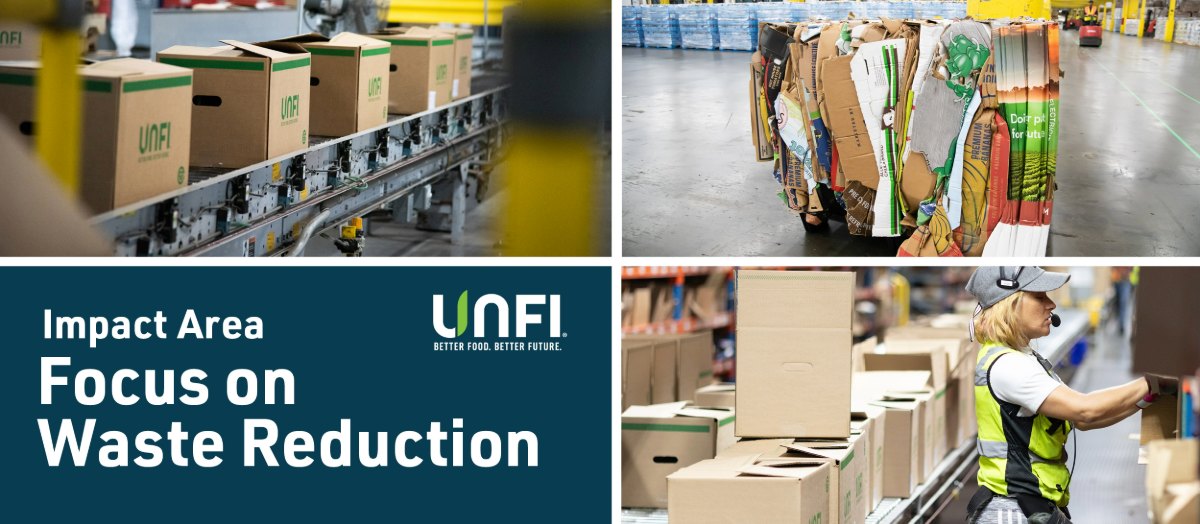Reducing Waste at UNFI: Driving Operational Excellence and Sustainability
February 26, 2025 5 minute read

At UNFI, waste reduction is more than just a goal for our company. It's part of our purpose, values, and business strategy. Reducing waste exemplifies how our impact strategy works in tandem with our business strategy to achieve our overall goals.
By focusing on keeping waste out of landfills, we continuously push ourselves to improve operational excellence, reduce shrink, ensure products reach retail consumers safely and efficiently, and lower waste disposal costs. This focus on doing the right thing while also striving to be better every day is a key driver to our progress in this impact area.
One of the main drivers of waste at UNFI is shrink. What is shrink? Simply put, shrink represents lost revenue and profit on products that could have been sold at full price, discounted, or donated. Examples of shrink include damaged products, spoiled products, or products that have expired. Damage or spoilage to products can occur when they are mishandled in the warehouse or during the delivery process, or when they are not maintained at the proper temperature. And sometimes product expires because it is not properly rotated in the warehouse.
Kevin Alavi, Director of Sustainable Operations at UNFI, explains that “there are multiple actions UNFI takes to eliminate shrink. We reduce shrink by limiting loss during the transportation process, optimizing procurement so we don’t have too much over-stock, and minimizing returns from customers by increasing delivery accuracy.”
We further reduce waste by salvaging and donating product that we can no longer sell. Kevin adds that, “when products are damaged but are still good, we salvage or donate them to local food banks. These donations align with our purpose and are a powerful vehicle for food redistribution.”
In FY2024, UNFI donated more than 20 million pounds of food. These donations include food that is recovered after UNFI Selling Shows. For example, at our most recent selling show in San Diego, UNFI partnered with Feeding San Diego to donate more than 28 thousand pounds of leftover food.
Our salvage efforts also enable partnerships with organizations like the Daily Table, a nonprofit operating grocery stores in Greater Boston providing affordable, nutritious food to the community. With our donated products and support from UNFI Foundation grants, Daily Table recently launched Flash Finds, a new program offering high-quality food at extremely low prices, helping families stretch their budgets while accessing nutritious food.
Our DC teams are at the forefront of shrink reduction efforts. Warehouse and dock associates work diligently to avoid contributing to product waste, while operations managers and supervisors stress the importance of minimizing shrink for the facility and the company.
Ashley Perry, the Inventory Control Manager at UNFI’s Twin Cities / Prescott DC, is passionate about this effort. “Instead of sending excess food to landfills, we have established partnerships with organizations like Feeding America to donate food within our communities, as well as throughout Minnesota and Wisconsin. I am proud to say that we not only satisfy our UNFI customers but are feeding our communities as well.”
Alejandro Orozco, Inventory Control Manager at UNFI’s Commerce DC, in California, adds, “We have rolled out several new programs at our DC that benefit our community and our environment by donating products that would have otherwise been disposed of. Now they are salvaged so they can be donated and kept out of landfills.”
While we have made great progress in waste reduction, we still have work to do. Shrink reduction is an ongoing effort that requires the dedication and collaboration of all UNFI associates. Together, we are committed to achieving our zero-waste goal by 2030 and driving operational excellence every step of the way.
This story is part of an ongoing series celebrating UNFI’s progress on our sustainability and impact goals. To learn more about our efforts, we invite you to explore our recently published Impact Report.
